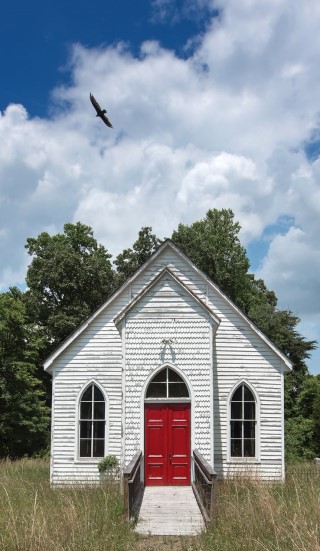|
CHURCH PROCEEDINGS; THE HAD-UPS; UNCLE MAC AND N. W. DUDLEY'S
QUARREL; CHURCH TRIAL, BAINE THE PREACHER IN CHARGE; WALKER'S
DICTIONARY AS A WITNESS IN THE TRIAL; THE RESULT.
In days long past (it is different now) if members of the church
had a quarrel and rough and insulting language was used they were,
even if women, "had up", as it was called, and the case laid wide
open in church, with closed doors.
So it came to pass that Uncle Mac, of witch fame, and Nat W.
Dudley, both church-members, had a funny little altercation, which
doubtless would not be noticed now by the church; but they were
"had up." I was young and not present when this laughable trial
came on for investigation, but I was informed of the evidence
brought out at this trial, and it was substantially as follows:
One rainy evening Dudley was spinning a yarn before a crowd at Mac
Beasley's blacksmith shop, to the effect that he had in some of
his travels seen corn grown so large that he could sit a-straddle
of the ears and cut its tops. Uncle Mac being present remarked
"any cat could do that," which remark angered Dudley. Uncle Mac
was a large, bony man and would have weighed at least one hundred
and seventy five pounds; while Dudley, I am quite sure, would have
weighed scarcely one hundred pounds.
But Dudley was grit all over and cared little for the
preponderance of Uncle Mac, and went for him. I don't recollect
precisely the result but I am sure there was no fight. This affair
got before the church; the preacher in charge was named Baine.
From the evidence procured, it turned out that Uncle Mac had
called his brother Dudley, that which was not his name, and which
to say the least, was unbrotherly. Uncle Mac, in explanation, said
that he had said "cat" because Dudley was so small; he considered
the comparison allowable; that he did not call him cat, but only
said any cat could have done as Dudley did in straddling said ears
of corn. It was evident that Baine, who was boss, was defending
the side of the smaller member, and had Walker's Dictionary to
define the word "cat," out of which he read: "Cat--a four footed,
domesticated animal; a kind of ship; a combination of pulleys; a
double tripod having six feet and which falls like a cat" (that's
it!" shouted Uncle Mac.) and so on to the end; then the preacher
said brother Dudley was neither. Thereupon Uncle Mac bawled out
the interrogatory that locally became so famous thereafter on the
Island: "What has Walker's Dictionary got to do with it anyway?"
Neither of these brethren made any overtures to the other, nor
were they turned out of church, but the case was left open for a
near future reconciliation.
The road matter was not in this trial, as both were Southenders.
It was said that Baine carried this trial beyond the usual limit
for the fun he got out of it, and the church enjoyed it to its
fill.
It strikes me that the word "cat" as applied to Dudley had a
teasing and tantalizing definition, not found in Walker's
Dictionary. About this time sixty five or seventy years ago, the
quarrels about the roads had become tiresome and matters looked
promising for peace.
Looking in the path of this cyclone nothing but social religious
derangement could be seen; hence, all fair minded people welcomed
an armistice.
The truly religious portion of the Island were glad once more to
see the gleam and feel the impressions of the past revivals of Tom
Jones and Anderson. It apperas that when war first comes everybody
takes a hand in slaughtering the enemy, especially those who stay
at home; while there are not five per cent in the field, doing the
real work of war. Even in such a war as Napoleon's French War, a
long and bloody tug will lessen the ire of the best fighting
soldiers. Such was the case in this road war; those that did not
fight in the open covertly encouraged the fighting crowds, until,
as in nature bound, they became tired of the conflict.
The Devil, so far, having been quite successful in the road
matter in mixing up both Church and world in a general row, and
every thing in the field appearing so satisfactory, concluded to
take a little rest on the hill-top of Mount Ease, leaving his
cause in the hands of his trained and efficient officers.
He was so satisfied in viewing his troops carrying out his
instructions that he must have dropped into a slumber; suddenly
was waited on and informed of the armistice.
The Devil, now looking from his height and accusing himself of
negligence and seeing his troops as on the eve of surrender, flew
into a furious rage, determined to end this armistice by throwing
a burning charge into the very heart of the enemy, stir up a
Waterloo in the church, and retrieve his lost ground. The
following will show whether or not he was successful.
Back to the top.
|
